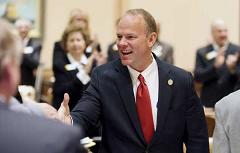As prices rise, States support natural gas vehicles |

March 11, 2011.
NGVAmerica congratulates the Wyoming Legislature, which has
responded to the ever increasing gasoline and diesel prices by
passing a law directing two state agencies to begin switching
their fleets to natural gas.
House Bill 235 was signed by Wyoming Governor Matt Mead this
week. The law appropriates $ 200.000 for the Wyoming Department
of Transportation and the Department of Administration and
Information to retrofit or acquire vehicles in their fleets that
are capable of running on natural gas. The state expects to
switch 20 vehicles to natural gas.
"Over the past few years, we’ve seen a steady growth in interest
in natural gas vehicles from government and private fleets,"
said Richard Kolodziej, president of NGVAmerica. "But with the
recent spike in gasoline and diesel prices, we’re seeing an even
bigger spike in fleet calls. Saving over $1 per gallon in fuel
cost has gotten everyone’s attention. The fact that natural gas
is primarily a domestic fuel and that NGVs produce less urban
pollution and greenhouse gases is just an added bonus.”
“Currently, 23 state legislatures are considering bills that
support natural gas as a transportation fuel, but Wyoming is the
first state to recently appropriate money for state fleets to
switch to natural gas.”
A handful of states have laws that support natural gas as a
transportation fuel, including rebates or tax credits for public
and private fleets to purchase vehicles or build infrastructure.
In the past, most of the legislation was introduced in states,
such as Wyoming, that produce
natural gas, but Kolodziej says he expects more states—and
cities -- to look at ways to save money on the ever-increasing
fuel costs. Natural gas costs on average one-third less than
gasoline or diesel fuel.
About 110.000 vehicles run on natural gas in the United States,
and most of these are fleet vehicles, including natural gas
powered buses and several large commercial fleets, such as UPS,
AT&T and Verizon. Transit fleets are the biggest consumers of
natural gas as a transportation fuel. The fastest growing
segment of natural gas vehicles is in the refuse market.
Because of the increasing interest in domestically produced
natural gas as a transportation fuel, there are regional
alliances across the country working to develop natural gas
fueling stations along the transportation corridors that serve
regional fleets. These regional alliances are in Texas,
California, the Northeast, the Southeast, along the I-75
corridor and in the Rockies. "We will be ready as more fleets make the economic decision to switch to natural gas," says Kolodziej.
|
